August 22, 2016
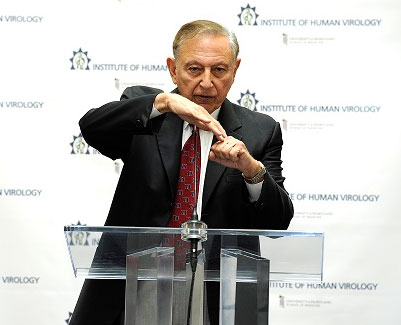
Baltimore-based scientists awarded grant to solve a major challenge in HIV-1 vaccine research
The Institute of Human Virology (IHV) at the University of Maryland School of Medicine announced today a $14.4 million grant from the U.S. National Institute of Allergy and Infectious Diseases (NIAID) to tackle a significant scientific global challenge in HIV vaccine research – the inability to produce long-lasting antibodies to protect against HIV infection. The announcement was made today by Robert C. Gallo, MD, The Homer & Martha Gudelsky Distinguished Professor of Medicine, Director, Institute of Human Virology, University of Maryland School of Medicine, and his colleagues George Lewis, PhD, Professor of Microbiology and Immunology, Director Division of Vaccine Research, Institute of Human Virology, University of Maryland School of Medicine and Anthony DeVico, PhD, Professor of Medicine, Division of Vaccine Research, Institute of Human Virology, University of Maryland School of Medicine. IHV’s grant collaborators include Guido Silvestri, MD at the Yerkes National Primate Research Center of Emory University and Warner Greene, MD, PhD, of the Gladstone Institute of Virology & Immunology at the University of California at San Francisco.
"Since our group co-discovered HIV as the cause of AIDS in the early 1980’s, I have long stated that any successful vaccine would need to block HIV infection from the start given the nature of retroviruses and HIV’s aggressive replication cycle," said Dr. Gallo, who pioneered the field of human retroviruses with his 1980 discoveries of the first human retroviruses (Human T cell Leukemia-1, or HTLV-1 and Human T cell Leukemia-2, or HTLV-2). "In order to do this, we must have persistent antibodies to protect against HIV."
HIV vaccine development presents unprecedented challenges on multiple levels, a reality, often overlooked, that cannot be overstated. The chief challenge is that HIV is a human retrovirus that replicates by irreversibly inserting its genes into the host genome. Thus, HIV infection is established permanently in a matter of days or perhaps even hours (1–6), and it cannot be cleared by primary or anamnestic responses that occur after exposure. In addition to integrating into the host genome, a second unique challenge is that HIV replicates in CD4+ T cells that are key players in protective immunity not only to HIV itself but also too many other pathogens. These central features distinguish the path to an HIV vaccine from the traditional design principles that led to successful vaccines against other infectious agents.[1]
"While we study the antibody sustainability problem, we need to activate T cells that fight HIV,” said Dr. Lewis. “However, T cells are also the very cells that HIV infect and kill. Thus, there is a fine balance we must reconcile so that we can examine and produce long-lasting antibodies for an effective vaccine."
Last fall, IHV launched Phase 1 clinical trials of a novel HIV vaccine candidate developed by Drs. Gallo, Lewis, DeVico and Tim Fouts, PhD of Baltimore-based Profectus Biosciences, Inc., a spinoff company from IHV. The candidate immunogen, denoted as the Full-Length Single Chain (FLSC), is designed to elicit strong protective antibody responses across the spectrum of HIV-1 strains. The IHV team will utilize the FLSC as a model system with the goal of finding ways to improve the efficacy and durability of all HIV vaccines.
"We have noticed an unusual, but not uncommon, phenomenon in HIV’s envelope protein that affects the sustainability of antibodies,” said Dr. DeVico. "We need to learn why this is happening so we can promote durability in our vaccine’s antibody response against HIV."
"We believe this antibody durability challenge is solvable,” said Dr. Gallo. "Importantly, funding sources and collaborators such as NIAID and The Bill & Melinda Gates Foundation are critical partners in our quest to solve this complex scientific challenge and we are grateful for their continued support, among others."
About the Institute of Human Virology
Formed in 1996 as a partnership between the State of Maryland, the City of Baltimore, the University System of Maryland and the University of Maryland Medical System, IHV is an institute of the University of Maryland School of Medicine and is home to some of the most globally-recognized and world-renowned experts in all of virology. The IHV combines the disciplines of basic research, epidemiology and clinical research in a concerted effort to speed the discovery of diagnostics and therapeutics for a wide variety of chronic and deadly viral and immune disorders - most notably, HIV the virus that causes AIDS. For more information, visit www.ihv.org and follow us on Twitter @IHVmaryland. You may also view a video about the IHV: http://ow.ly/T7Isr
[1] Lewis GK, DeVico AL, Gallo RC. Antibody persistence and T-cell balance: two key factors confronting HIV vaccine development. Proc Natl Acad Sci U S A. 2014;111(44):15614-21. doi: 10.1073/pnas.1413550111. PubMed PMID: 25349379; PMCID: 4226080.
Contact
Department of Anesthesiology
(410) 328-6120 (phone)
(410) 328-5531 (fax)
swalsh@som.umaryland.edu
Nora Samaranayake
Director of Marketing and Public Relations
(410) 706-1954 (phone)
(410) 706-1952 (fax)
nsamaranayake@ihv.umaryland.edu
Related stories
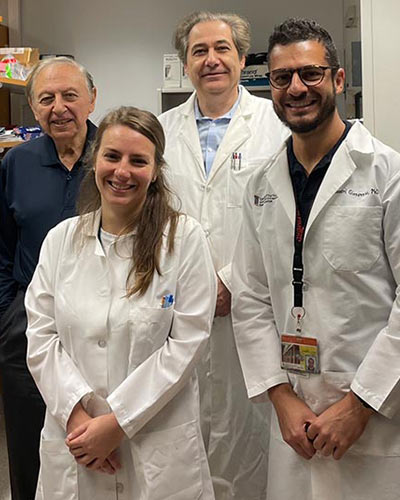
Monday, July 17, 2023
Researchers from the Institute of Human Virology Discover that a Bacterial Protein Causes Genomic Instability and Contributes to Reduced Fertility, and Birth Defects
A team of researchers from the University of Maryland School of Maryland’s (UMSOM) Institute of Human Virology (IHV), a Center of Excellence of the Global Virus Network (GVN), published new findings that emphasize the crucial role of the urinary and genital tract microbiota in adverse pregnancy outcomes and genomic instability that originate in the womb during fetal development.
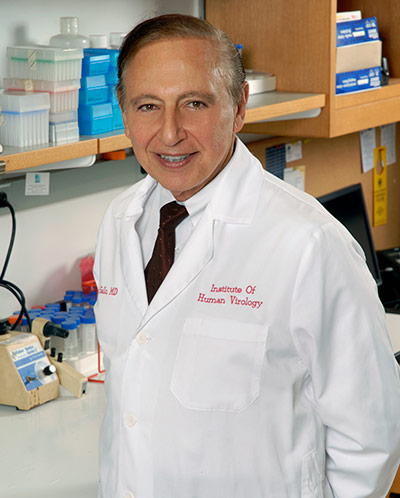
Tuesday, March 28, 2023
Two-Time Lasker Awardee and Internationally Acclaimed Virologist, Robert C. Gallo, MD, To Step Down as Director of UM School of Medicine’s Institute of Human Virology (IHV)
Robert C. Gallo, MD, one of the world’s leading virologists and cancer researchers, announced he has stepped down from his position as Director of the Institute of Human Virology (IHV) at the University of Maryland School of Medicine (UMSOM), effective March 24.
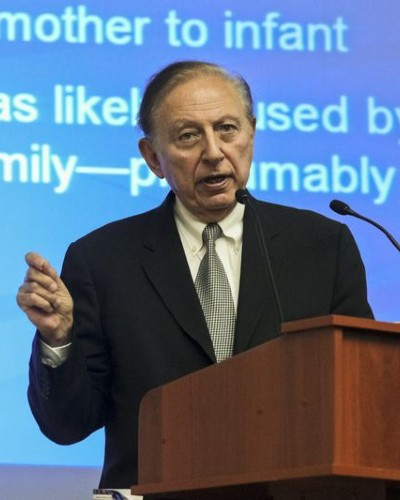
Friday, April 02, 2021
Baltimore Sun: Q&A with Dr. Robert Gallo: ‘The world has to be linked to fight a pandemic’
Robert Gallo, the eminent virologist best known as co-discoverer of the AIDS virus, says the world needs a system to confront viral disease that’s free of politics and primed to quickly warn nations about new threats as if “the bad Martians are coming.” The uneven and politicized response to the coronavirus pandemic, with a worldwide toll approaching 3 million, including 553,000 deaths in the United States, proves Gallo’s point.
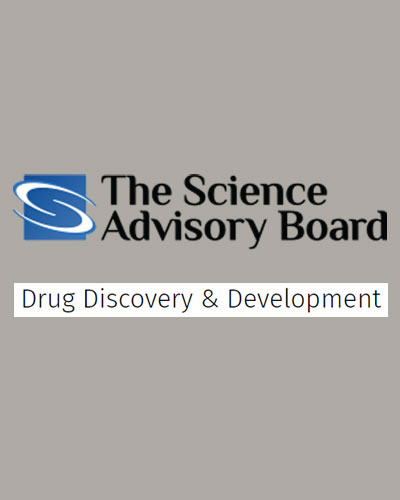
Thursday, February 18, 2021
The Science Advisory Board: The next generation of COVID-19 vaccines: Gallo on next steps
With emergency authorizations for several COVID-19 vaccines under our belt, the question remains if these vaccines will be enough to carry us through the end of the pandemic. Experts agree that there will likely need to be additional vaccines to achieve full recovery. In this two-part series, we discuss what a next-generation COVID-19 vaccine might look like, and which candidates are in the running for authorizations.
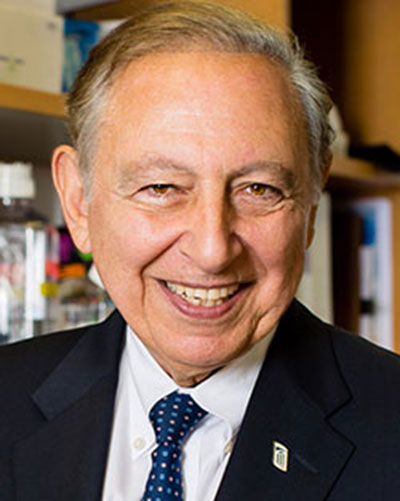
Friday, February 12, 2021
The Washington Post: Scientists said claims about China creating the coronavirus were misleading. They went viral anyway.
The spread of the unverified assertions by Chinese scholar Li-Meng Yan, widely dismissed as “flawed,” show how vulnerable scientific sites are to misuse and misunderstanding.

Friday, February 12, 2021
China CDC Weekly: Commentary by Dr. Robert C. Gallo
The Great Coronavirus Pandemic of 2019−2021: the Future and the Requirement for China-America Cooperation - Over the past century, the great pandemics and most epidemics (defined as virus presence and disease induction presenting more than the expected number of infections in a population) were caused by the sudden outbreak of an RNA virus such as the pandemics of influenza, polio, and HIV/AIDS and the epidemics of influenza, Ebola, Dengue, Zika, West Nile, severe acute respiratory syndrome (SARS), Middle East respiratory syndrome (MERS), and Chikungunya.
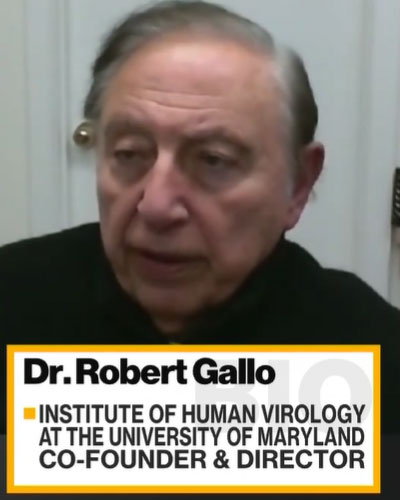
Friday, December 11, 2020
Bloomberg TV Asia: Dr. Robert Gallo on COVID-19 Vaccines
Dr. Robert Gallo, co-founder and international scientific advisor of the Global Virus Network and the co-founder and director of the Institute of Human Virology at the University of Maryland School of Medicine, discusses the rollout of the Covid-19 vaccines. The first Covid-19 vaccine expected to be deployed in the U.S. won the backing of a panel of government advisers, a step that will likely help clear the way for emergency authorization by the Food and Drug Administration. Gallo, who co-discovered HIV as the cause of AIDS in 1984, speaks with Haidi Stroud-Watts and Shery Ahn on "Bloomberg Daybreak: Australia." (Source: Bloomberg)
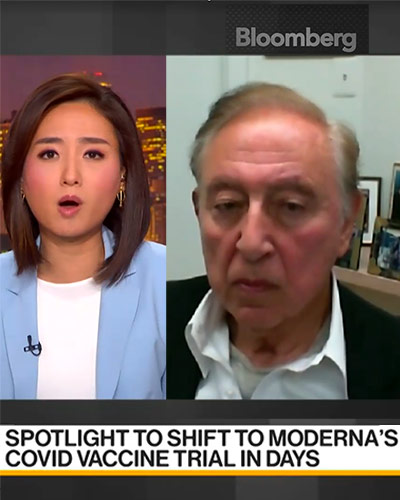
Wednesday, November 11, 2020
Dr. Robert Gallo on Bloomberg Asia on COVID Vaccine Prospects
Dr. Robert C. Gallo, The Homer & Martha Gudelsky Distinguished Professor in Medicine, co-founder and director of the Institute of Human Virology at the University of Maryland School of Medicine and co-founder and international scientific advisor of the Global Virus Network, discusses the timeline and safety of Covid-19 vaccine trials. He speaks with Shery Ahn and Haidi Stroud-Watts on "Bloomberg Daybreak: Asia".
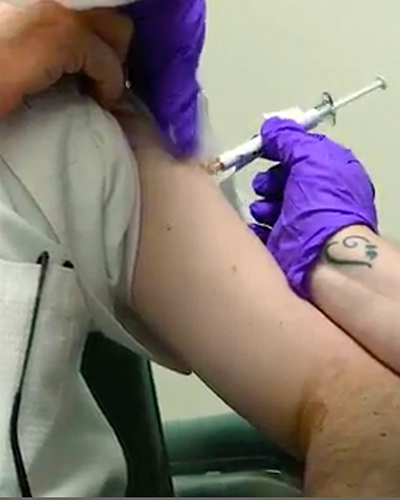
Sunday, November 01, 2020
The Scientist: How Some Vaccines Protect Against More than Their Targets
As researchers test existing vaccines for nonspecific protection against COVID-19, immunologists are working to understand how some inoculations protect against pathogens they weren’t designed to fend off.
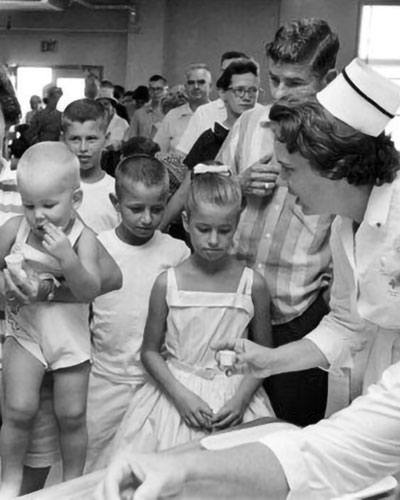
Friday, August 28, 2020
WYPR: Could Polio Vaccine Corral Covid-19?
A safe, effective vaccine against Covid-19 could resurrect jobs, send kids back to classrooms--change our lives. But how safe and effective? And how quickly can we have it? Dr. Robert Gallo, the AIDS-research pioneer now leading virus science at the Institute of Human Virology at the University of Maryland School of Medicine and the Global Virus Network, argues we could get much of the benefit by inoculating people with an old, very cheap drug -- the oral Polio vaccine developed seven decades ago. Gallo contends it would trigger our ‘innate immunity’-- the body’s emergency response when a threat shows up.
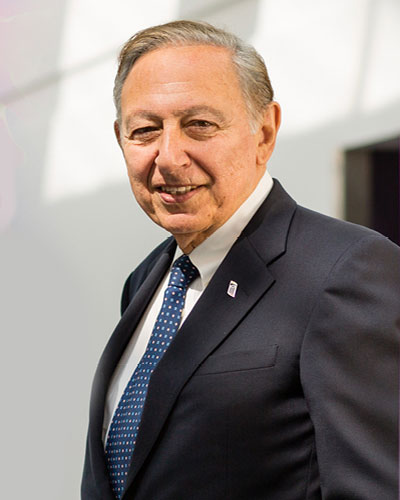
Monday, August 03, 2020
Eureka, Charles River Laboratories: Could the Oral Polio Vaccine be Used to Prevent COVID-19?
Virologist Robert Gallo, MD, has had a long and storied career in academic and government research. He is the Homer & Martha Gudelsky Distinguished Professor in Medicine, co-founder and director of the Institute Human Virology (IHV) at the University of Maryland School of Medicine and co-founder and international scientific adviser of the Global Virus Network. Despite his deep roots in HIV, Dr. Gallo’s current focus is, not surprisingly, COVID-19, which emerged in China last year and within four months morphed into a full-blown pandemic. As usual, Dr. Gallo’s research strategy has raised eyebrows. Unlike the antibody and RNA vaccines that are all the rage in COVID-19 science, Gallo is putting his energies behind repurposing the oral polio virus vaccine developed in the 1950s by Albert Sabin.
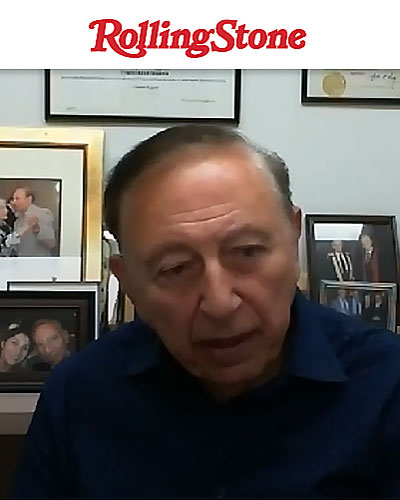
Friday, July 31, 2020
RollingStone-Useful Idiots: Dr. Robert Gallo on a COVID-19 Vaccine
Dr. Robert Gallo, director of the Institute for Human Virology at the University of Maryland School of Medicine, joins the show to give his take on the prospects for an effective COVID-19 vaccine. Gallo is skeptical of the approach many organizations are taking with antibody vaccines, citing the similarly low efficacy those treatments had with HIV due to the low durability of the antibodies. Dr. Gallo’s research is mainly related to Oral Polio Vaccine, which he thinks needs to be tested more in regard to innate immunity.
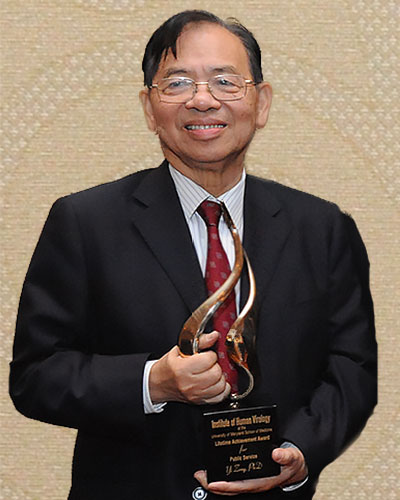
Friday, July 24, 2020
A Statement from the Leadership of the Institute of Human Virology and the Global Virus Network on the Passing of Renowned Chinese Virologist Yi Zeng
The IHV at the University of Maryland School of Medicine and the Global Virus Network (GVN), a coalition comprised of the world’s preeminent human and animal virologists from 55 Centers of Excellence and 10 Affiliates in 32 countries, collectively mourns the passing of Professor Yi Zeng, MD, Academician of the Chinese Academy of Sciences, former President of the Chinese Academy of the Preventive Medicine and former Dean of the College of Life Science and Bioengineering at Beijing University of Technology.
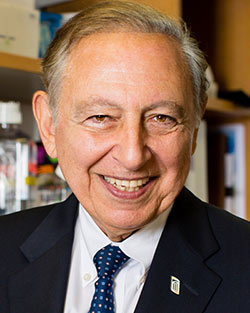
Monday, July 20, 2020
NPR: Early Oxford-AstraZeneca Coronavirus Vaccine Data 'Encouraging,' Scientists Say
Dr. Robert Gallo is quoted about an experimental vaccine candidate being developed by AstraZeneca and Oxford University to protect against COVID-19 that triggered an immune response against the coronavirus and appeared to be safe.

Tuesday, July 07, 2020
Courthouse News Service: Global Progress on Ending HIV/AIDS Derailed by Covid-19
A United Nations program aimed at eliminating HIV/AIDS released a report Monday showing that the global response to the epidemic has fallen far short of goals set for 2020, in large part due to the coronavirus pandemic.
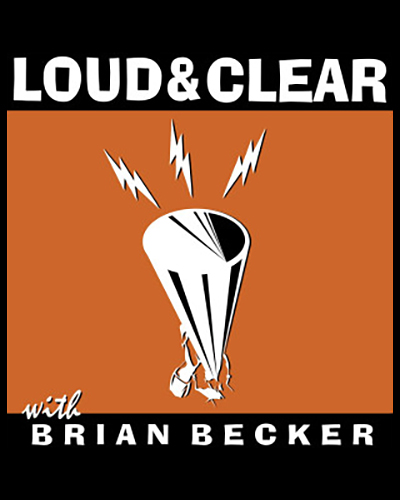
Monday, July 06, 2020
Sputnik Radio: What If There Is No Vaccine for COVID-19?
On today's episode of Loud & Clear, Brian Becker and John Kiriakou are joined by Robert Gallo, MD, the Homer & Martha Gudelsky Distinguished Professor in Medicine, co-founder and director of the Institute Human Virology at the University of Maryland School of Medicine and co-founder and international scientific adviser of the Global Virus Network. What would you think if someone told you that we already have a vaccine that at least helps fight Covid-19? That may already be the case. Two American scientists, Dr. Robert Gallo and Dr. Konstantin Chumakov, are positing that decades-old live vaccines for things like polio and tuberculosis strengthen the immune system’s first line of defense a more general way to fight infection. And the history books show us that that sometimes translates into at least some cross-protection against completely different viruses.
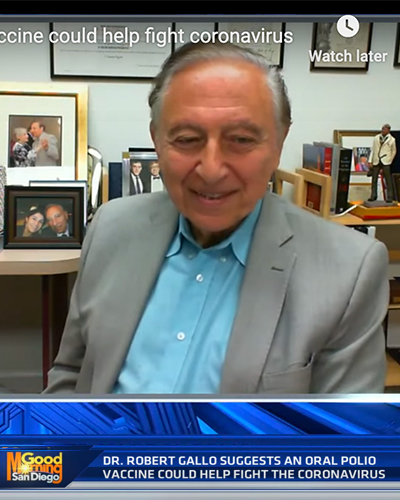
Friday, July 03, 2020
KUSI San Diego News: Dr. Robert Gallo suggests an oral polio vaccine could help fight coronavirus
Dr. Robert Gallo from the Institute of Human Virology at the University of Maryland School of Medicine and Global Virus Network wrote an op-ed in the Wall Street Journal earlier this week. The opinion piece stated that OPV, oral polio vaccine, could be a cheap and effective way to fight coronavirus. Dr. Gallo discussed his opinion piece on Good Morning San Diego.
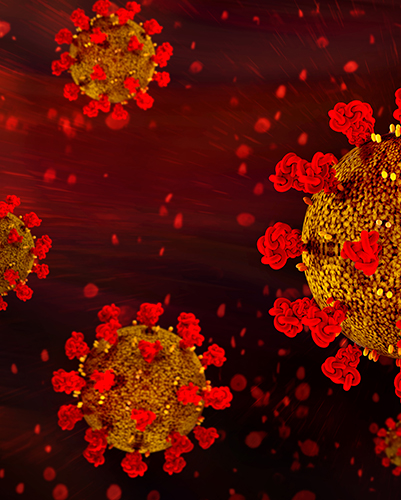
Thursday, July 02, 2020
13D Global Strategy & Research Report
COVID-19 outbreaks are multiplying and immunity may be short-lived. Could existing “live” vaccines, which stimulate innate immunity, outshine vaccines targeting the “spike” protein?

Thursday, June 25, 2020
The New York Times: Dr. Robert Gallo: The Case for a Stopgap Vaccine
In a letter to the editor to The New York Times entitled, "Dr. Robert Gallo: The Case for a Stopgap Vaccine," the noted virologist and head of the IHV says a polio vaccine may be an ideal solution until we find a Covid-specific vaccine.
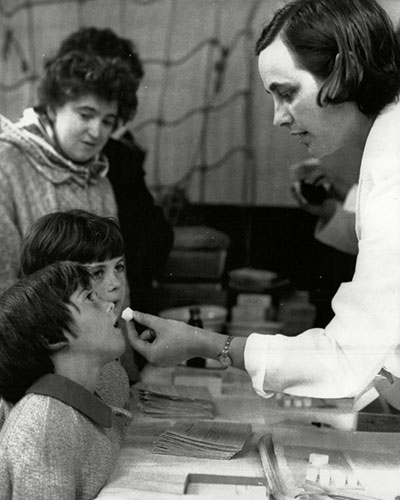
Wednesday, June 24, 2020
The New York Times: Decades-Old Soviet Studies Hint at Coronavirus Strategy
The New York Times: Decades-Old Soviet Studies Hint at Coronavirus Strategy: A married pair of virologists in Moscow tested a vaccine on their own children in the 1950s. Now, a side effect they found is sparking new hope for a defense against the coronavirus.

Friday, June 12, 2020
The Washington Post: We shouldn’t care who wins the vaccine ‘race’
Dr. Robert Gallo writes a Letter to the Editor to The Washington Post entitled, “We shouldn’t care who wins the vaccine ‘race’,” regarding their June 4 front-page article “Cold War echoes in race for vaccine,” about the “race” among nations, notably the United States, China, and Russia and other European nations for development of a vaccine against the novel coronavirus.
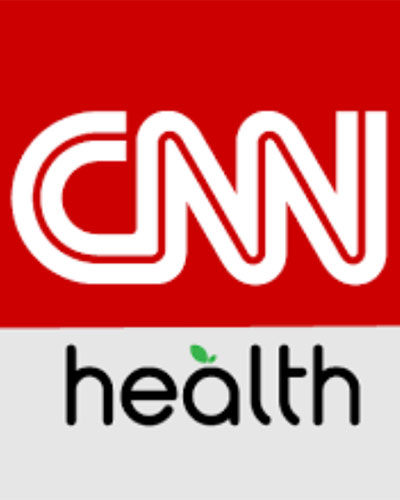
Friday, June 12, 2020
CNN Health: An Existing Polio Vaccine Could Help Protect Against Coronavirus, Top Experts Say
CNN: There is plenty of evidence that existing inoculations such as polio vaccines protect children against a wide range of infections and it's worth trying them out against the new coronavirus, a team of experts wrote in Science magazine Thursday.
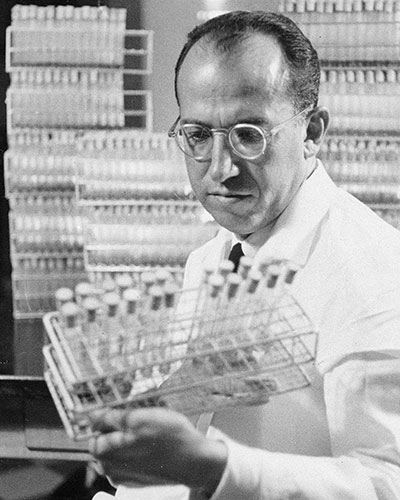
Thursday, June 11, 2020
NBC News: Polio Vaccine Could Give Temporary Protection Against COVID-19, Scientists Hope
NBC News: As the world waits for a coronavirus vaccine, some scientists are proposing that existing vaccines could give the body’s immune system a much-needed temporary boost to stave off infection. It’s still unclear whether such an approach would work, and some experts are skeptical. Others — including researchers in Israel, the Netherlands and Australia — are already investigating whether a tuberculosis vaccine could help jump-start the immune system and make COVID-19 less deadly, though the World Health Organization strongly advises against using that vaccine until it’s proven effective against the coronavirus.
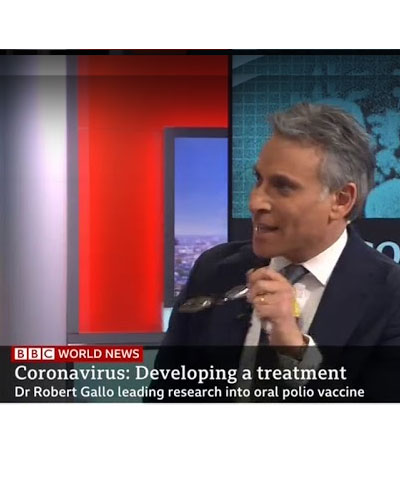
Monday, May 11, 2020
BBC Global News Interviews Dr. Robert Gallo on Oral Polio Vaccine for SARS-CoV-2 and More
Dr. Robert Gallo appeared on BBC World News with Matthew Amroliwala for a one-on-one, lengthy interview during their Coronavirus Explained segment.
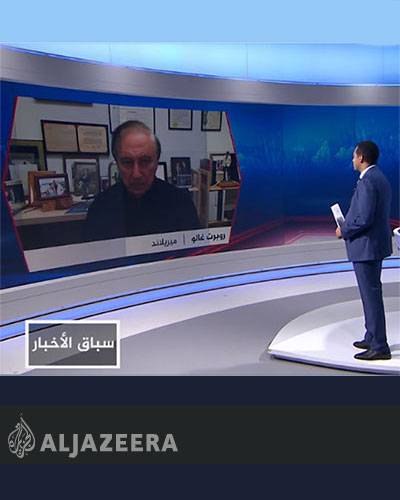
Saturday, May 09, 2020
Dr. Robert Gallo Discuss COVID-19 Research on Aljazeera News
Aljazeera discusses the status of therapy, testing and vaccine research on SARS-CoV-2/COVID-19 with Dr. Robert Gallo.
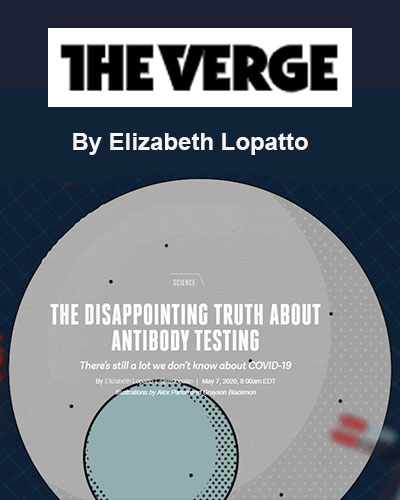
Thursday, May 07, 2020
The Disappointing Truth About Antibody Testing: There’s still a lot we don’t know about COVID-19
Dr. Robert Gallo discusses the status of COVID-19 antibody test with Vox's The Verge
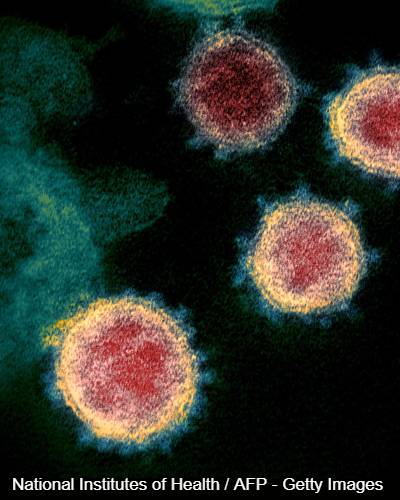
Wednesday, May 06, 2020
The Coronavirus Appears to have Mutated. What Does that Mean for Contagiousness?
While small mutations in the virus's genetic code are evident, it's unclear what these changes mean for people, if anything at all.
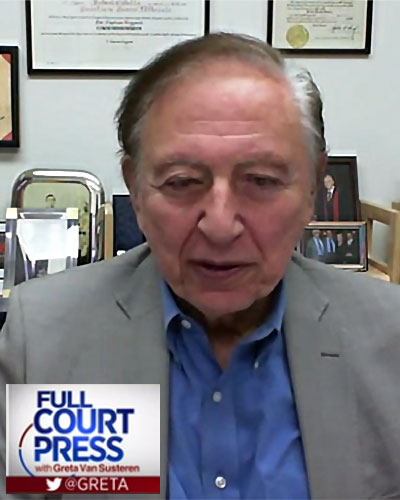
Saturday, May 02, 2020
IHV's Dr. Robert Gallo on FOX's Full Court Press with Greta Van Susteren
Overtime: Dr. Robert Gallo talks coronavirus treatments and antibody testing.

Saturday, May 02, 2020
Dr. Robert Gallo on iHeart Radio to Discuss COVID-19
Ryan Gorman hosts an iHeartRadio nationwide special featuring experts on COVID-19-related issues, including the co-founder and director of the Institute Human Virology at the University of Maryland School of Medicine, the senior vice president for U.S. Programs & Advocacy at Save the Children, and the managing editor of the Military Times. Topics range from a discussion about why some people infected by the coronavirus are asymptomatic, while others face severe reactions and even death, to assistance for impoverished children, and a breakdown of the impact the virus is having on the U.S. military and veterans.
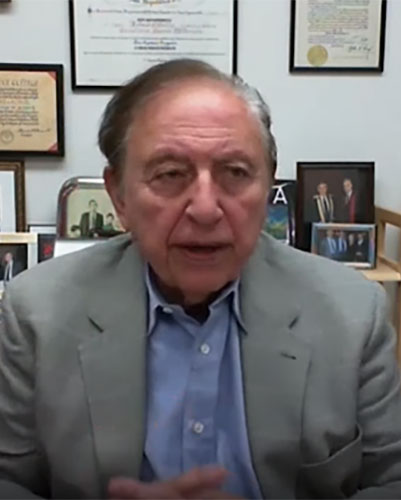
Friday, May 01, 2020
Could an Oral Polio Vaccine Stop the Coronavirus Pandemic?
A YouTube video by the American Chemical Society and produced by PBS.
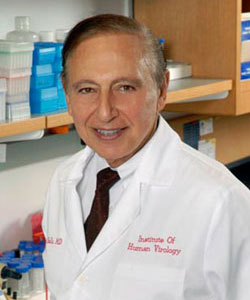
Wednesday, April 22, 2020
Dr. Robert Gallo Featured on National Geographic’s “Jane Goodall: The Hope” on 50th Anniversary of Earth Day
For the 50th anniversary of Earth Day on April 22, 2020, the National Geographic channel will broadcast back-to-back premieres of Photo Ark: Rarest Creatures and Jane Goodall: The Hope.
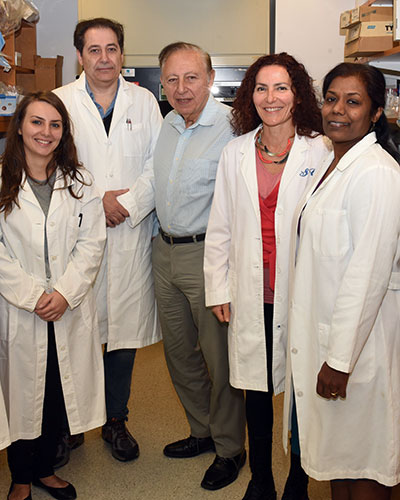
Tuesday, December 04, 2018
Institute of Human Virology Researchers Discover That a Bacterial Protein Promotes Cancer
The Institute of Human Virology (IHV) at the University of Maryland School of Medicine (UMSOM) announced today the discovery that DnaK, a protein of the bacterium mycoplasma, interferes with the mycoplasma-infected cell’s ability to respond to and repair DNA damage, a known origin of cancer.
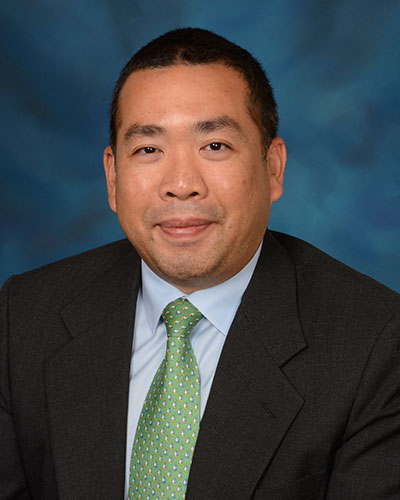
Monday, December 03, 2018
Institute of Human Virology Names Dr. Man Charurat as Director of the Center for International Health, Education, and Biosecurity
The Institute of Human Virology (IHV) at the University of Maryland School of Medicine today announced the appointment of Man E. Charurat, PhD, MHS, Professor of Medicine and Director of the Division of Epidemiology and Prevention at the IHV as the Director of IHV’s Center for International Health, Education, and Biosecurity (CIHEB). Dr. Charurat will replace Deus Bazira, DrPH, MPH, MBA. The announcement was made by Robert C. Gallo, MD, The Homer & Martha Gudelsky Distinguished Professor in Medicine, Co-Founder and Director of the IHV, and Co-Founder and Director of the Global Virus Network (GVN).

Tuesday, October 23, 2018
Institute of Human Virology Hosts 20th Annual International Meeting of Top Medical Virus Researchers in Baltimore, Maryland
The Institute of Human Virology (IHV) at the University of Maryland School of Medicine yesterday commenced IHV’s 20th Annual International Meeting, to be held through Thursday, October, 25 at the Four Seasons Hotel in Baltimore, Maryland. This year, among other viral and cancer related topics, the meeting is holding special sessions on the 40th anniversary of the first human retrovirus, Human T cell Leukemia Virus (HTLV), and the 15th anniversary of the President’s Emergency Plan for AIDS Relief (PEPFAR). IHV’s Annual International Meeting attracts hundreds of elite scientists who descend upon Baltimore to share ideas and inspire medical virus research collaborations.
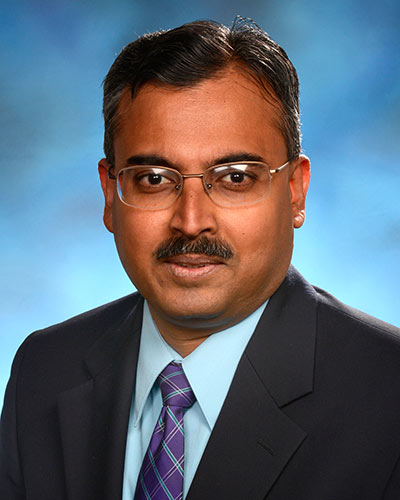
Wednesday, September 19, 2018
Institute of Human Virology (IHV) Awarded $12M to Combat Opioid Epidemic Through Clinical Research Trials
The Institute of Human Virology (IHV) at the University of Maryland School of Medicine will lead a $12 million dollar project to improve the morbidity and mortality of people with opioid use disorder (OUD). Utilizing a novel compound, IHV researches will implement a series of investigations, entitled SEARCH, to evaluate the underlying mechanisms of craving reduction as a strategy to prevent opioid misuse, dependence, and relapse. The grant is awarded through the National Institutes of Health’s (NIH) Helping to End Addiction Long-term (HEAL) Initiative, made possible through groundbreaking funding from the U.S. Congress.
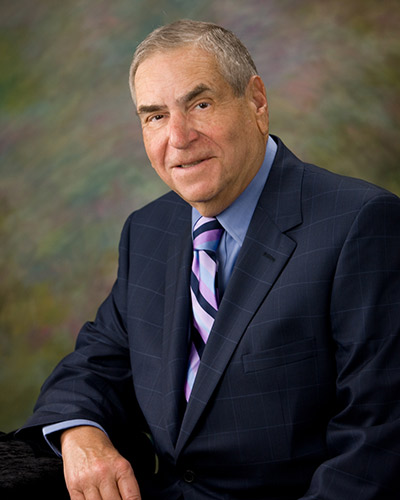
Tuesday, December 12, 2017
A Statement from the Leadership of the Institute of Human Virology on the Passing of Stewart Greenebaum
The Institute of Human Virology (IHV) at the University of Maryland School of Medicine mourns the passing of Stewart Greenebaum, a lifelong Baltimore resident, former president of Greenebaum and Rose Associates, and past chairman of the IHV Board of Advisors, as well as a guiding force in the establishment of the IHV at the University of Maryland, Baltimore.
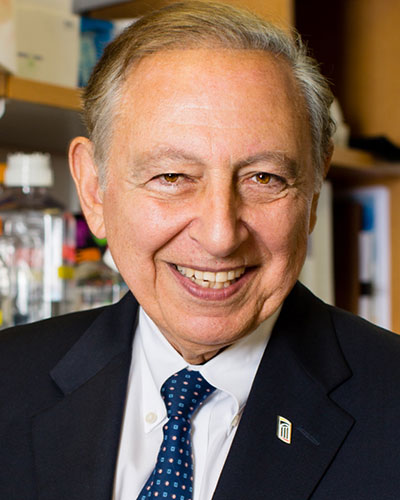
Wednesday, November 29, 2017
To Mark World AIDS Day, Institute of Human Virology Releases Video on Dr. Robert Gallo
The Institute of Human Virology (IHV) at the University of Maryland School of Medicine (UMSOM) released a video on Dr. Robert Gallo, a trailblazer in HIV research, in advance of World AIDS Day, December 1. While many know Dr. Gallo for his pioneering work in AIDS research, the short video focuses on Dr. Gallo’s life and legacy in its entirety, including his pioneering discovery of human retroviruses.
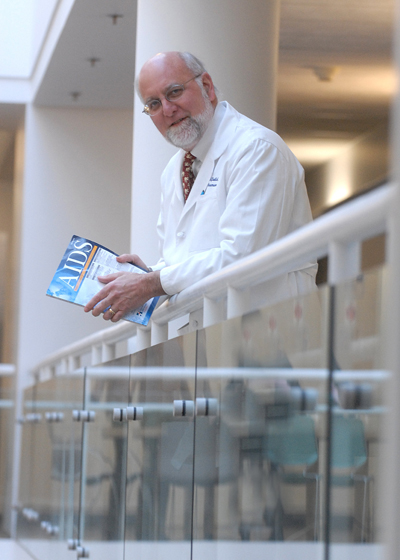
Monday, December 12, 2016
Two Prominent Institute of Human Virology Researchers Honored With Robert C. Gallo, MD Endowed Professorships in Translational Medicine
An investiture ceremony was held recently to name Robert Redfield, Jr., MD, and George Lewis, PhD as the Robert C. Gallo, MD Endowed Professors in Translational Medicine.

Tuesday, October 25, 2016
"A Call to End HIV/AIDS in America" IHV Director Dr. Robert Gallo's Op-Ed in the Huffington Post
As the new Administration is presented with great challenges facing the United States, one will be a longtime foe, the U.S. HIV/AIDS epidemic. Since President Barack Obama was elected in 2008, I have publicly called on our country’s leaders to utilize the largest global health initiative in history - the President’s Emergency Plan for AIDS Relief (PEPFAR) - as a model to address the U.S. epidemic.
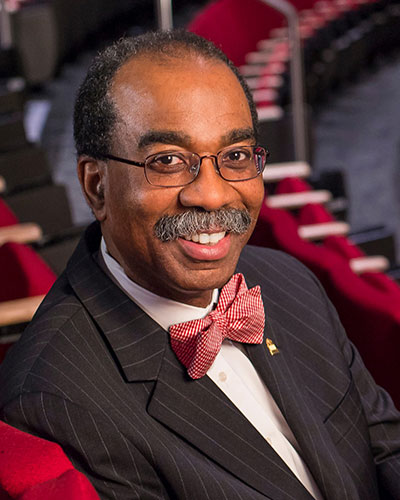
Thursday, March 10, 2016
UM SOM Establishes Two Endowed Professorships Through Private Gifts and Matching State Funds
University of Maryland School of Medicine (UM SOM) Dean E. Albert Reece, MD, PhD, MBA, announced today that the School has been awarded matching funds from the Maryland Department of Business and Economic Development (DBED) as part of the Maryland E-Nnovation Initiative Fund program. The funds, when combined with private philanthropy, will enable UM SOM to establish two new endowed professorships – one in human virology and vaccine development, the other in surgical science and entrepreneurship.
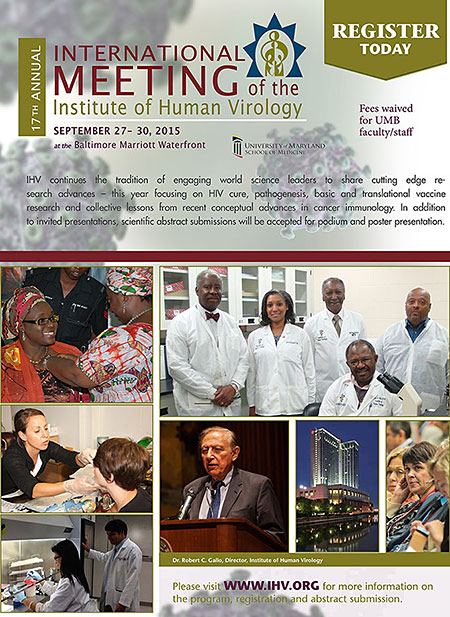
Tuesday, September 29, 2015
Institute of Human Virology Hosts International Meeting of Prominent AIDS Researchers
The Institute of Human Virology (IHV) at the University of Maryland School of Medicine is hosting IHV’s 17th Annual International Meeting Sunday, September 27 through Wednesday, September 30 at the Baltimore Marriott Waterfront Hotel in Baltimore, Maryland.

